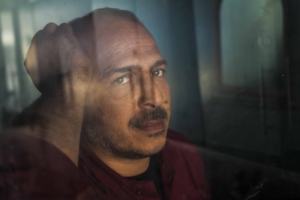Our emotional makeup helps us to experience all that the world throws at us and to respond appropriately to it all. A beautiful sunrise or sunset makes you feel warm inside, and you smile, draft a poem, or hug a loved one to express what you feel.
 The death of a loved one or the loss of a long-cherished dream break you up inside, and gush forth tears, sadness and anger intermingled. Our emotions alert us to what’s going on inside of us and how we’re experiencing the world, so they are helpful for everyday life.
The death of a loved one or the loss of a long-cherished dream break you up inside, and gush forth tears, sadness and anger intermingled. Our emotions alert us to what’s going on inside of us and how we’re experiencing the world, so they are helpful for everyday life.
Anger is a powerful emotion, one which can overwhelm us and even short-circuit our ability to think and act rationally. Anger can be ignited by anything, from an existential threat to you and your loved ones to an annoyance like stubbing your toe on a piece of raised concrete. We get angry when people challenge us, when we are taken advantage of, or when we see wrongdoing, and so much else.
Powerful emotions like anger need to be shepherded well because the consequences of letting anger run amok can be dire. So, while anger is a helpful emotion that alerts us to what we’re experiencing and what may need to be remedied, how one deals with that anger is of the utmost importance.
Below are a few signs of anger issues that may indicate you’re no longer in the driver’s seat, and your feelings of anger are in charge. If anger is an issue for you, don’t hesitate to reach out to a mental health professional for help. Newport Beach Christian Counseling offers support and guidance to help individuals navigate and manage their anger in a healthy and constructive way.
Seven signs of anger issues
1. You’re afraid of what will happen if you get angry.
 Have you ever scared yourself because of how you reacted to a situation? For example, your child or spouse did something that annoyed you, and your reaction was so over the top that you found yourself shocked and scrambling to apologize and figure out where that reaction even came from.
Have you ever scared yourself because of how you reacted to a situation? For example, your child or spouse did something that annoyed you, and your reaction was so over the top that you found yourself shocked and scrambling to apologize and figure out where that reaction even came from.
People have deep wells of feeling within them, and they don’t always know what’s in those wells; sometimes, stuff comes gushing out that we struggle to make sense of. The Bible warns us, “The heart is deceitful above all things, and desperately sick; who can understand it?” (Jeremiah 17:9, ESV).
For you, maybe you struggle with the things you say and do when you’re angry, and you’re afraid of what might come out of you if you happen to get angry. If you’re afraid of your anger and what results from it, it may be a clear sign that you have anger issues.
2. Relationships have been destroyed because of your anger.
Ambrose Bierce , the short story writer, journalist, and poet once wrote, “Speak when you are angry, and you will make the best speech you will ever regret.” Sometimes, the time between words spoken in anger and the feeling of regret is instant, and at other times it can take a lifetime to understand the damage caused by words spoken in anger.
Anger affects your ability to listen with empathy and make reasoned judgments. When you’re angry, you don’t always think about what you’re saying, and what you’re saying tends to be poorly thought out. In anger, we tend to generalize, leap to conclusions, and override the feelings and perspectives of others. All of this escalates conflict and damages relationships.
If relationships have been damaged because of your anger, it’s quite likely that you have anger issues. Whether you shouted at your spouse or kids, snapped at a client, gave a snarky retort to your neighbor, physically assaulted a friend, or spilled a long-held secret, anger may have led you to damage that relationship, perhaps irreparably.
3. You struggle to articulate your anger.
The thing to do with anger is to express it so that your feelings are acknowledged. It’s not good to either repress the feelings of anger or to express them in such a way that they cause physical or emotional damage to yourself or others.
Repressed anger, as well as passive-aggressive anger and violent expressions of anger, are equally destructive, though the first two are directed more internally, and the latter externally. You should be able to express your anger in a clear, assertive (not aggressive) way that doesn’t damage others along the way. If you can’t express your anger well, that’s also a sign of anger issues.
4. Your anger is disproportionate to the situation.

There isn’t a chart that lays out what a reasoned response to any given situation should be. That doesn’t mean that there is no such thing as an unreasonable or disproportionate response to a situation. Responding to someone cutting you off in traffic by pursuing them down the highway and then physically assaulting them should rank as an overreaction.
If the grocery store has run out of a particular product, it’s out of bounds to verbally assault a store employee or to damage store property. Getting into a fistfight with other patrons because the buffet ran out of steak or because a fast-food establishment ran out of a chicken sandwich is probably a reaction that’s disproportionate to the situation. It may indicate that you have anger issues.
5. You’ve been in trouble with the law.
If your anger has led you into situations and making decisions that got you in trouble with the law, that might also be a sign of anger issues. If your anger leads you to break the law because you’ve threatened violence, assaulted someone, or damaged property, that may be a sign that your anger has a hold over you.
6. You feel angry most or all of the time.
There is no shortage of things in the world to make a person angry. However, you can’t be angry all the time or allow things to get under your skin. If anger is the dominant emotion in your life, and you feel angry for many or most of your waking hours, or you’re constantly feeling impatient, irritated, and hostile, then you may have a problem with anger.
7. Your anger threshold is low.
What makes you angry? We’re all wired differently, and our experiences shape our temperaments in various ways. If you get angry quite easily and let things get to you without much provocation, you’ve got a low anger threshold. Having a low anger threshold isn’t problematic if you’re able to express that anger effectively and let things go.
 However, because anger has a physiological effect, being angry a lot because you have a low anger threshold means that you’re putting your health at risk. Chronic anger increases your risk of stroke, it weakens your immune system, not to mention higher risks of high blood pressure, heart problems, headaches, skin disorders, and digestive problems.
However, because anger has a physiological effect, being angry a lot because you have a low anger threshold means that you’re putting your health at risk. Chronic anger increases your risk of stroke, it weakens your immune system, not to mention higher risks of high blood pressure, heart problems, headaches, skin disorders, and digestive problems.
Growing beyond the problem
Anger doesn’t have to maintain its hold on you. It is possible to overcome the devastating effects of uncontrolled anger. For one thing, you can begin to look at the challenging circumstances and people in your life through a different lens. Instead of dwelling on unpleasant experiences in the past and looking at things from a negative standpoint, there is a different way to go, as this quote reminds us:
Forget what hurt you in the past, but never forget what it taught you. However, if it taught you to hold onto grudges, seek revenge, not forgive or show compassion, to categorize people as good or bad, to distrust and be guarded with your feelings then you didn’t learn a thing.
God doesn’t bring you lessons to close your heart. He brings you lessons to open it, by developing compassion, learning to listen, seeking to understand instead of speculating, practicing empathy and developing conflict resolution through communication. If he brought you perfect people, how would you ever learn to spiritually evolve? – Shannon L. Alder
To overcome anger issues, it’s also important to look deeper, because anger can be caused by any number of things, from physiological processes such as chronic pain, hunger, fear, or panic. Anger can also be a symptom of a mental health issues such as depression, bipolar disorder, dementia, or Alzheimer’s.
An anger problem may also be rooted in childhood trauma, or there may be specific events in a person’s life that have given shape to their personality and how they react to situations. In some cases, hormonal changes can also cause anger. To get behind and beyond these possible causes, it’s important to speak with a health professional to eliminate these other causes.
A mental health professional can help you not only by diagnosing an issue with anger but also by helping you understand the root cause of the anger issues. Your story is unique, as are the resources you possess to deal with anger.
Your counselor will walk alongside you, helping you begin to recognize your anger triggers while giving you tools for anger management and strategies to cope with anger such as breathing exercises, regular exercise, and good sleep hygiene. They can help you begin repairing damage to relationships caused by anger and to begin walking in the joy and peace of the Lord. These words of David to the Lord can be true of you:
You make known to me the path of life; you will fill me with joy in your presence, with eternal pleasures at your right hand – Psalm 16: 11, NIV
Instead of anger, you can know and experience joy, as that is what God desires for people. Reach out for Newport Beach Christian Counseling today to get help with overcoming anger issues.
Photos:
“Waterfall”, Courtesy of Joshua Sortino, Unsplash.com, CC0 License; “Waterfall”, Courtesy of Gabrielle Mustapich, Unsplash.com, CC0 License; “Waterfall”, Courtesy of Brayden Law, Unsplash.com, CC0 License; “Waterfall”, Courtesy of Rei Kim, Unsplash.com, CC0 License
 Life is not stagnant; it is full of change. Throughout your life, you will have different jobs, churches, houses, cars, and relationships. There will be changes you choose to make as well as changes that are outside of your control. Newport Beach Christian Counseling can help you navigate these transitions with wisdom and support.
Life is not stagnant; it is full of change. Throughout your life, you will have different jobs, churches, houses, cars, and relationships. There will be changes you choose to make as well as changes that are outside of your control. Newport Beach Christian Counseling can help you navigate these transitions with wisdom and support.To humans belong the plans of the heart, but from the Lord comes the proper answer of the tongue. All a person’s ways seem pure to them, but motives are weighed by the Lord. Commit to the Lord whatever you do, and he will establish your plans. – Proverbs 16:1-3, NIV
 Peter was a devout Jewish man. Yet after witnessing the death, resurrection, and ascension of Jesus Christ, he was required to change his mind about a lot of religious rules with which he grew up. We sometimes need to make similar changes about our beliefs.
Peter was a devout Jewish man. Yet after witnessing the death, resurrection, and ascension of Jesus Christ, he was required to change his mind about a lot of religious rules with which he grew up. We sometimes need to make similar changes about our beliefs.

 Depression: Taking care of a family member can bring you to a place of depression. You feel as though you aren’t doing things correctly. Sometimes you feel like crying.
Depression: Taking care of a family member can bring you to a place of depression. You feel as though you aren’t doing things correctly. Sometimes you feel like crying. It becomes easy to lose ourselves in an addictive stupor, scrolling other people’s pages and profiles. Subconsciously, we compare ourselves with a perceived ideal God never intended for us to idolize, but rather encounter inspiration for attaining our own goals.
It becomes easy to lose ourselves in an addictive stupor, scrolling other people’s pages and profiles. Subconsciously, we compare ourselves with a perceived ideal God never intended for us to idolize, but rather encounter inspiration for attaining our own goals. When we develop SMART goals, we do so around the following: garner the specifics of what we intend to accomplish, narrow our attention on clear objectives; measure our progress; and assess and ensure that they are attainable within a certain amount of time. Ideally, the goals we establish are relevant, aligning with our longer-term goals, and are reasonable for the time frame we have identified.
When we develop SMART goals, we do so around the following: garner the specifics of what we intend to accomplish, narrow our attention on clear objectives; measure our progress; and assess and ensure that they are attainable within a certain amount of time. Ideally, the goals we establish are relevant, aligning with our longer-term goals, and are reasonable for the time frame we have identified. Goal-setting is a familiar topic within the realm of personal development, but micro habits present a fresh way to think about this timeless concept. Micro habits deconstruct massive endeavors into smaller, more digestible parts.
Goal-setting is a familiar topic within the realm of personal development, but micro habits present a fresh way to think about this timeless concept. Micro habits deconstruct massive endeavors into smaller, more digestible parts. Embracing micro habits affords us the joy that accompanies small wins, thus replenishing necessary strength in our personal development journey. We will meet challenges, but the outcomes we desire generally result from consistency versus large-scale, though sporadic actions.
Embracing micro habits affords us the joy that accompanies small wins, thus replenishing necessary strength in our personal development journey. We will meet challenges, but the outcomes we desire generally result from consistency versus large-scale, though sporadic actions. You are not alone if you are struggling with anxiety. But you can use Scripture to overcome anxiety and have greater peace. These Bible verses that deal with anxiety can help you when you feel triggered or stressed. If you’re looking for additional support,
You are not alone if you are struggling with anxiety. But you can use Scripture to overcome anxiety and have greater peace. These Bible verses that deal with anxiety can help you when you feel triggered or stressed. If you’re looking for additional support,  You will keep in perfect peace those whose minds are steadfast, because they trust in you. – Isaiah 26:3, NIV
You will keep in perfect peace those whose minds are steadfast, because they trust in you. – Isaiah 26:3, NIV Consider the following examples of worrying thoughts:
Consider the following examples of worrying thoughts: Examine the evidence
Examine the evidence Look for evidence
Look for evidence However, mental health professionals have come to realize that mindfulness can be of great benefit, as it can help people become better able to become better able to separate themselves from negative thoughts, emotions, and bodily sensations that may be present, often before they become too overwhelming.
However, mental health professionals have come to realize that mindfulness can be of great benefit, as it can help people become better able to become better able to separate themselves from negative thoughts, emotions, and bodily sensations that may be present, often before they become too overwhelming. This is the first reference to rest. But this is more than taking a break. Genesis 2:3 describes this rest as something special, something God blessed and made holy. It is this key element that defines Sabbath in our lives.
This is the first reference to rest. But this is more than taking a break. Genesis 2:3 describes this rest as something special, something God blessed and made holy. It is this key element that defines Sabbath in our lives. While there are different opinions on what Sabbath looks like, how people should practice it, and when it should be observed, you can discover the benefits of the Sabbath in your life no matter how you do it. It is less about following strict guidelines and more about developing a rhythm of rest and worship that feeds your soul.
While there are different opinions on what Sabbath looks like, how people should practice it, and when it should be observed, you can discover the benefits of the Sabbath in your life no matter how you do it. It is less about following strict guidelines and more about developing a rhythm of rest and worship that feeds your soul. As you look at the spiritual aspects of the Sabbath, such as prayer and corporate worship, the mental health benefits are also evident.
As you look at the spiritual aspects of the Sabbath, such as prayer and corporate worship, the mental health benefits are also evident.


 This is a warning to us not to fly into a rage or harbor resentment over some incident, either at home or at work. It indicates a lack of self-control, exposes weak character traits, and is not godly in attitude. We need to refrain from anger and instead honor God in our hearts.
This is a warning to us not to fly into a rage or harbor resentment over some incident, either at home or at work. It indicates a lack of self-control, exposes weak character traits, and is not godly in attitude. We need to refrain from anger and instead honor God in our hearts. Therefore I want the men everywhere to pray, lifting up holy hands without anger or disputing. – 1 Timothy 2:8, NIV
Therefore I want the men everywhere to pray, lifting up holy hands without anger or disputing. – 1 Timothy 2:8, NIV Few decisions in our lives shoulder the weight of success or sabotage like matters of the heart. While our choice to follow Christ is the most significant choice that impacts all others, who we link with in dating or in marriage, polarizes our path. It either fuels us in fulfilling God’s purpose for our lives or frustrates us in walking toward destiny.
Few decisions in our lives shoulder the weight of success or sabotage like matters of the heart. While our choice to follow Christ is the most significant choice that impacts all others, who we link with in dating or in marriage, polarizes our path. It either fuels us in fulfilling God’s purpose for our lives or frustrates us in walking toward destiny. God, who is Beginning and End, has ordained our life to reflect His glory on earth (Revelation 1:8). He wants you to see the wonder of His image in you. As you pray, ask Him to harmonize your ideas and plans with His. Pay attention to the wisdom of the Scriptures as you form plans and goals that maximize your gifts and align with His purpose.
God, who is Beginning and End, has ordained our life to reflect His glory on earth (Revelation 1:8). He wants you to see the wonder of His image in you. As you pray, ask Him to harmonize your ideas and plans with His. Pay attention to the wisdom of the Scriptures as you form plans and goals that maximize your gifts and align with His purpose.
 However, walking in agreement, that is aligned with Jesus and not in step with the world, is foundational to establishing a dating partnership and eventual marriage. While the external person initially attracts, the internal is integral to what nurtures a marital covenant over the long term.
However, walking in agreement, that is aligned with Jesus and not in step with the world, is foundational to establishing a dating partnership and eventual marriage. While the external person initially attracts, the internal is integral to what nurtures a marital covenant over the long term. When a loved one is in pain, the vulnerability and emotional pain you go through can be debilitating. The feeling of helplessness can be all-consuming, paralyzing you into inaction. In those situations, great courage and fortitude are required to push through those feelings of helplessness and instead focus on being supportive and present for our loved ones.
When a loved one is in pain, the vulnerability and emotional pain you go through can be debilitating. The feeling of helplessness can be all-consuming, paralyzing you into inaction. In those situations, great courage and fortitude are required to push through those feelings of helplessness and instead focus on being supportive and present for our loved ones. anxiety
anxiety
 Medications such as antidepressants may be prescribed to help to cope with depression and get the body and mind back where they need to be. Usually, there are some side effects from the medication, and so the psychotherapist will likely adjust the type of medication and its dosage to meet the client’s needs.
Medications such as antidepressants may be prescribed to help to cope with depression and get the body and mind back where they need to be. Usually, there are some side effects from the medication, and so the psychotherapist will likely adjust the type of medication and its dosage to meet the client’s needs. The death of a loved one or the loss of a long-cherished dream break you up inside, and gush forth tears, sadness and anger intermingled. Our emotions alert us to what’s going on inside of us and how we’re experiencing the world, so they are helpful for everyday life.
The death of a loved one or the loss of a long-cherished dream break you up inside, and gush forth tears, sadness and anger intermingled. Our emotions alert us to what’s going on inside of us and how we’re experiencing the world, so they are helpful for everyday life. Have you ever scared yourself because of how you reacted to a situation? For example, your child or spouse did something that annoyed you, and your reaction was so over the top that you found yourself shocked and scrambling to apologize and figure out where that reaction even came from.
Have you ever scared yourself because of how you reacted to a situation? For example, your child or spouse did something that annoyed you, and your reaction was so over the top that you found yourself shocked and scrambling to apologize and figure out where that reaction even came from.
 However, because anger has a physiological effect, being angry a lot because you have a low anger threshold means that you’re putting your health at risk. Chronic anger increases your risk of stroke, it weakens your immune system, not to mention higher risks of high blood pressure, heart problems, headaches, skin disorders, and digestive problems.
However, because anger has a physiological effect, being angry a lot because you have a low anger threshold means that you’re putting your health at risk. Chronic anger increases your risk of stroke, it weakens your immune system, not to mention higher risks of high blood pressure, heart problems, headaches, skin disorders, and digestive problems.